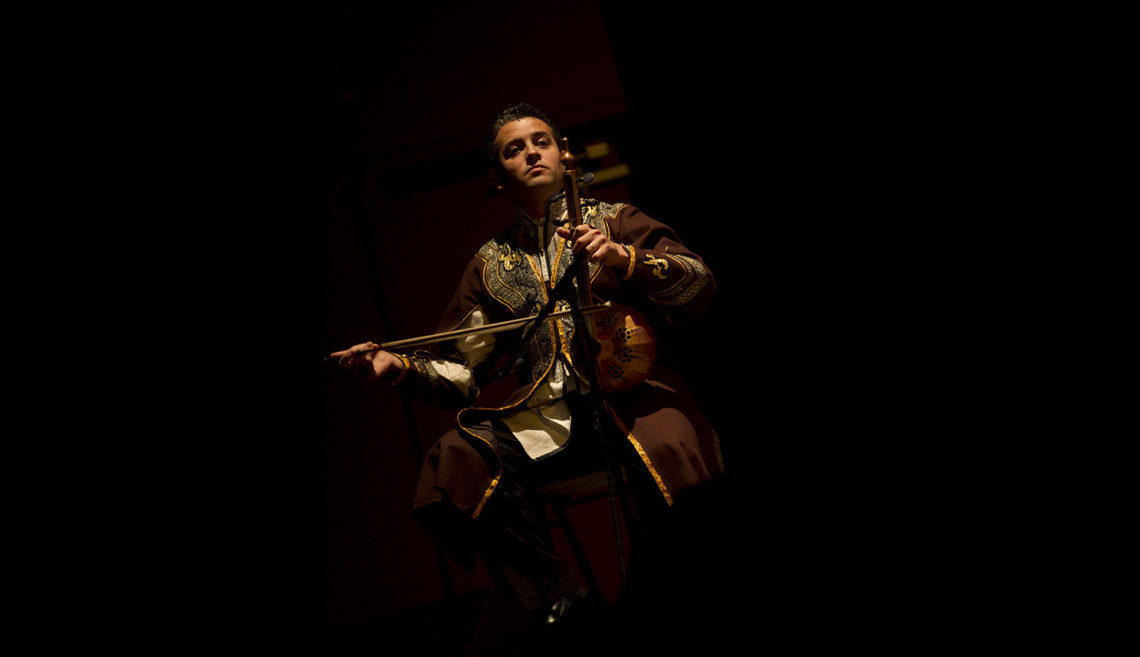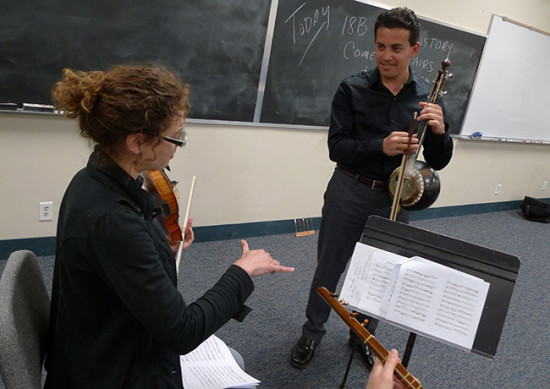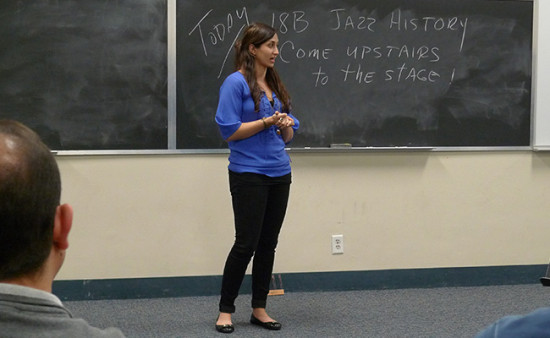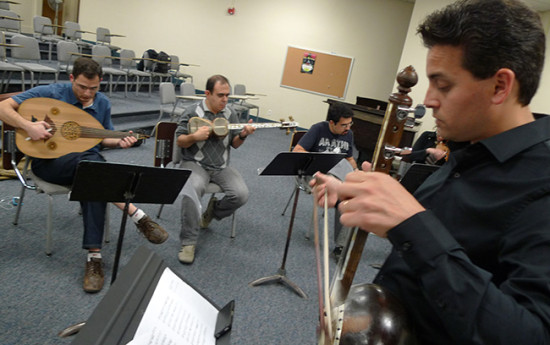
Imamyar Hasanov plays the kamancha at the San Francisco World Music Festival.
Michael SantoroStanford Department of Music partners with San Francisco World Music Festival to present a course on Azerbaijani music
Music and Culture from the Land of Fire: Introduction to Azerbaijani Mugham is taught by Azerbaijani kamancha virtuoso Imamyar Hasanov and music specialist Krystal Barghelame.
This spring the Stanford Department of Music in partnership with the San Francisco World Music Festival is offering an innovative music course titled Music and Culture from the Land of Fire: Introduction to Azerbaijani Mugham, taught by the festival’s Global Music Director and Azerbaijani kamancha virtuoso Imamyar Hasanov and Azerbaijani music specialist Krystal Barghelame, BA ’08, MA ’09.
Nestled in the Caucasus, Azerbaijan is a crossroads between East and West; its rich musical heritage contains threads of Turkish, Central Asian, Persian, Caucasian, Russian and Arabic traditions. In this course, master-musician Hasanov teaches students to perform and appreciate Azeri music.
Structured as half a music workshop and half a lecture seminar, the course gives students a composite understanding of Azerbaijani music through both playing and studying. The interdisciplinary and multimedia format is inspired by the World Music Festival’s approach to studying and performing music from diverse cultural traditions. The course is open to Stanford students with any experience playing a musical instrument (including voice), and non-musician Stanford students can take the seminar portion of the course for 1-3 units. As a culmination to the course, the class will collaborate to produce a final event that will be open to the community.

“We have an interest in increasing our offerings in non-Western music,” says Anna Schultz, assistant professor of music (ethnomusicology). “It’s a treat and a privilege to work with a master musician like Imamyar Hasanov, who is at the top of his field. One of the things that is so wonderful about the World Music Festival is the innovative, multimedia approach they take toward presenting music and educating, and that is a phenomenal boon to our students and will really enrich their experience.”
“Our mission is to spread awareness about diverse and treasured music traditions within interdisciplinary and multimedia learning environments, and hopefully inspire students to consider themselves globalized citizens of the world.”
Students will have the opportunity to learn Azeri music and the kamancha, a bowed string instrument; dive into Azeri music history and culture; and use interactive live-streaming technology to meet Azeri musicians. Working closely with both lecturers, students also will have opportunities to participate in select music conservation projects in Baku, Azerbaijan, as well as intern for the World Music Festival, which premieres its annual commissions November 22-24, 2013.
Developed by Founder/Artistic Director Michael J. Santoro, the San Francisco World Music Festival Lectureship Initiative matches the nonprofit organization’s Global Music Directors (representing China, Azerbaijan, India, Tibet, Mali and more), who are already top-level traditional masters in their respective music fields, with high-profile lectureship positions at prestigious universities and institutions of higher learning.

“The San Francisco World Music Festival is honored and excited to launch a blossoming partnership with Stanford University,” says Santoro. “Our mission is to spread awareness about diverse and treasured music traditions within interdisciplinary and multimedia learning environments, and hopefully inspire students to consider themselves globalized citizens of the world. This course offers a unique opportunity to bring in master musician Imamyar Hasanov to inspire Stanford students to learn about Azerbaijani traditional music and global music production, with special attention to innovative critical thinking and learning.”
Master instructors
Hasanov’s musical qualifications are outstanding. A master’s graduate of the Azerbaijan National Conservatory, he is an extraordinary performer who brilliantly embodies the cultural depths and classical creativity of Azerbaijani traditional music. Moreover, he is gaining recognition in the United States as an Azerbaijani traditional music revivalist, spreading the art form of the kamancha through his concerts and tours. Hasanov’s live solo performances exemplify his virtuosity, especially when performing some of the older traditional repertoire with innovative techniques. Besides featured roles in five San Francisco World Music Festivals, his recent performance highlights include concerts at the Smithsonian Folklife Festival in Washington, D.C., Symphony Space in New York, the Richmond Folk Festival in Virginia and tours in Turkey, Luxembourg, Greece and Israel. Throughout the world, there are only a handful of musicians of his technical proficiency, experience and versatility.

As an artist of the highest accomplishment in his respective music form, students will benefit from Hasanov’s teaching. In his current position as Global Music Director/Azerbaijan for the World Music Festival, he takes an important step toward fostering greater American understanding of Azerbaijani music and its peoples.
Barghelame is an Azeri music specialist with bachelor’s and master’s degrees in, respectively, music composition and modern thought and literature, from Stanford, and a master’s degree with distinction in ethnomusicology, focusing on Azerbaijani music, from the School of Oriental and African Studies in London. She has studied classical composition under Franghiz Ali-Zadeh in the United States, Berlin and Baku. She also has won awards across the United States for her original compositions. With her ethnomusicology training and strong academic scholarship, Barghelame will lead the seminar portion of the course. Her Azeri-American perspectives and experience at Stanford will facilitate and bridge communication between Hasanov and the Stanford students.
Festival history and mission
Founded in 1995, the mission of the San Francisco World Music Festival is to harness the power of music to cultivate human nature and inspire social change. In addition to supporting and revitalizing traditional music cultures around the world, the festival creates multi-generational, transcultural dialogues through innovative staged productions, music research, documentary films and educational resources. The unique position within the arts enables the staff to develop effective strategies for promoting global synergy and the diversity of cultures around the world.
The San Francisco World Music Festival is one of the most distinguished in the country, dedicated to producing some of the highest caliber traditional masters from the Bay Area and around the world. Moreover, the festival has become a major “music think tank” and “producing laboratory” for traditional music, the only one of its kind in the world. The organizers work with, design and produce traditional masters of the highest caliber, promote the revitalization of cultural music in endangered villages around the world and re-invest in the next generation of traditional music performers in the San Francisco Bay Area as well as overseas.
